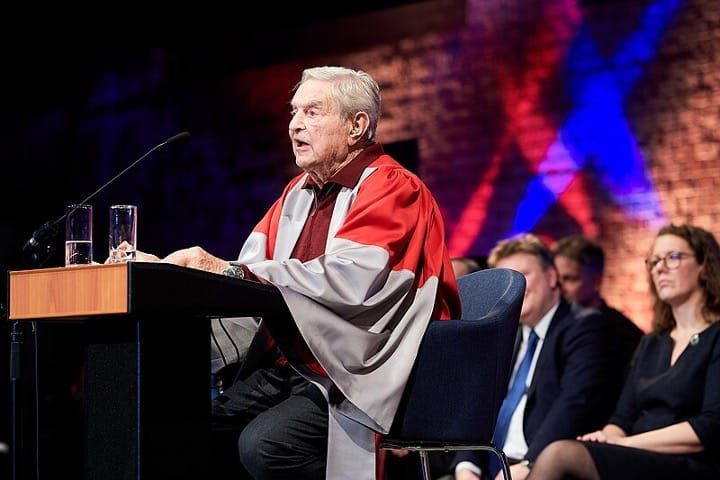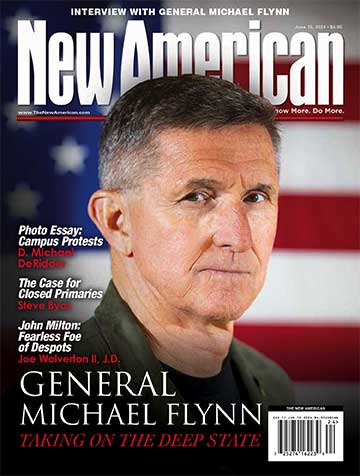
George Soros has earned a reputation as one of the most visible and pernicious agents of the globalist oligarchy. His involvement in the affairs of Western nations has been deep and transformative.
As the 92-year-old left-wing billionaire financier approaches the end of his days and shifts control of his empire to his equally ambitious son, Alexander, it is worth examining why George Soros has become such a force to be reckoned with in international politics.
Soros has risen to such power that he steers the destinies of entire nations — and yet the Hungarian-born, self-proclaimed philanthropist has never held public office. This fact alone reveals an important insight into political power in the modern world:
The traditional institutions associated with state power, government and military, are not the chief sources of power in the 21st century.
In the ancient world, military superiority was the main determinant of political power. The ruler with the greater army reigned and had the ability to subjugate other nations, turning them into tribute-paying vassals and thus accumulating enormous wealth for himself.
In the modern world, money has become the chief means to political power. This is not to say that money has never before been a determinant in politics; even in historical monarchies, kings depended on bankers and money-lenders. Many an empire was lost due to the public treasury drying up and not having the wherewithal to defend imperial possessions.
But there are modern factors that have made money a stronger force in global politics and have facilitated the rise of financial oligarchs such as Soros.
One of these factors is the diffusion of representative government. Wherever there are politicians seeking election, there is a need for money to finance political campaigns. Naturally, those who have the money to give to the office-seekers gain power over the politicians whose election to office they finance.
Another factor is the rise of the bureaucratic state, which is also tied to the growth of representative government. Whereas in monarchies the nobility constituted a hierarchical system dividing up the work of governing a nation, in modern Western “democracies,” the governing is instead handled by a civil service of career bureaucrats. And how are these bureaucrats chosen?
Ostensibly, they are selected according to merit and preparedness. But how is this to be determined? What ends up happening is that the “merit” and credentials of bureaucrats are often determined by their associations with all the “right” institutions — universities, fraternities, foundations, think tanks. Globalists such as Soros take control of or flat-out create these institutions so that the future civil servants they produce are all in ideological alignment with them and beholden to their patronage. These future civil servants are beholden to the globalists’ patronage because often government work can be unreliable, so between stints in government, these bureaucrats will find work at globalist-controlled universities, foundations, think tanks, law firms, consulting firms, etc.
It is through this unique ecosystem built from a combination of politically targeted private sector investment, campaign finance, and “philanthropic” work that Soros and his ilk exercise what is known as financial warfare.
The Chinese have long been aware of Soros’ role in waging financial warfare to further his own political aims. In the 1999 book Unrestricted Warfare, authored by two colonels in the People’s Liberation Army, we read:
What is more, such a defeat on the economic front precipitates a near collapse of the social and political order.… Thus, financial war is a form of non-military warfare which is just as terribly destructive as a bloody war, but in which no blood is actually shed. Financial war has now officially come to war’s center stage—a stage that for thousands of years has been occupied only by soldiers and weapons, with blood and death everywhere.… Moreover, when people revise the history of books on twentieth-century warfare in the early 21st century, the section on financial warfare will command the reader’s utmost attention. The main protagonist in this section of the history book will not be a statesman or military strategist; rather, it will be George Soros.
… It is reported that Soros and his “Quantum Fund” lost not less than several billion dollars in Russia and Hong Kong alone. Thus we can get at least an inkling of the magnitude of financial war’s destructive power.
As The New American has previously reported, the various programs promoted and established by George Soros are ultimately funded by the global wealth of the Rothschild banking dynasty, which gave Soros the seed money for his Quantum Fund when he first got started in 1969.
Since making his fortune, Soros has largely influenced global politics through his Open Society Foundations network. George Soros recently revealed he is handing Alexander control of his empire, including the chairmanship over Open Society. And the younger Soros has quipped that he is “more political” than his father.
Thus, even after George Soros passes to the other side, the House of Soros is sure to continue playing the role of kingmaker in world political affairs.




